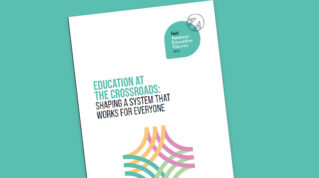The start of a new academic year should be a time for excitement as well as reflection, for looking forward, but also for glancing over your shoulder. For me, this year marks a decade since I finished school and left for university. And my reflections on that formative time in my life have been made more poignant by a new UCAS report I have been involved in, looking at the experiences of LGBT+ students as they prepare to take their next steps.
Like so many others, coming to terms with my sexual orientation would have been far easier had the first instance of hearing the word “gay” been in a positive context rather than as a slur. Encouragingly, our results show that this is the case for more of our students today. LGBT+ students in the class of 2021 have, by and large, had a positive experience in school and college.
In May, UCAS surveyed almost 3,000 LGBT+ students – over ten per cent of the nearly 30,000 students who shared their sexual orientation or gender identity when they were applying to university or college.
Of those who responded, 47 per cent said their experience of being LGBT+ at school or college was good or very good, and another 41 per cent said their experience was neutral. Of those who had a good experience, over three-quarters said this was due to being accepted by their peers.
But these are a self-selecting group who were confident enough to share their identity and orientation and to answer our survey, and even among this group, 12 per cent said their experience was bad or very bad, rising to 17 per cent for trans students. It’s reasonable to suspect that number is higher.
A truly inclusive curriculum could improve countless young lives
For those LGBT+ students who did not have a good time at school or college, 70 per cent said the reason was that their identity was not reflected in what they were taught in the classroom. Further proof that a truly inclusive curriculum that celebrates difference could improve countless young lives, and a clear vindication for the hard-won reforms to sex and relationships education reforms that came into force last September.
The power of this obligation on schools to include “sensitive and age-appropriate” content about LGBT+ people and identities cannot be underestimated. In another decade’s time, the next generation to tell their story will not be telling one of taboo but of seeing themselves and being seen.
Today, although things are getting better for many young people, this is not universally the case. Our research shows that trans students are more likely to have had a bad time at school or college, to struggle with mental health issues and to have lower academic attainment overall.
To address this, the education sector must ensure there is specific support for trans students as they progress through education. As well as putting anti-bullying policies in place and creating fostering environments that promote inclusion, visible strategies to support all LGBT+ students should have a specific focus on trans students. At present, they are the most vulnerable of a still-vulnerable community.
There is much to cheer as we mark the start of this new academic year, with 77 per cent of LGBT+ students venturing on to their higher education journey in the expectation that their experience will be good or very good.
These students intend to be more open about their sexual orientation and gender identity in higher education than they were at school or college, with overall levels of openness increasing from 64 per cent at school to an expected 82 per cent at university.
There is always more to do in the battle for acceptance, and schools continue to be central in driving those vital changes in our social norms. Things are better than when I left ten years ago, but how will they be better still for the next school leavers in ten months’ time? I hope this report guides school leaders as they take their next steps.














Your thoughts